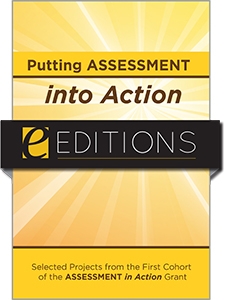
Putting Assessment into Action: Selected Projects from the First Cohort of the Assessment in Action Grant—eEditions e-book
The download link for this product can be found on the final confirmation screen after you complete your purchase, and may also be accessed from your Account Profile. For more information about ALA eEditions file types and how to view them on eReaders, desktop computers, and other devices, see this page.
Primary tabs
You don't need to be an ALA Member to purchase from the ALA Store, but you'll be asked to create an online account/profile during checkout to proceed. This Web Account is for both Members and non-Members. Note that your ALA Member discount will be applied at the final step of the checkout process.
If you are Tax-Exempt, please verify that your account is currently set up as exempt before placing your order, as our new fulfillment center will need current documentation. Learn how to verify here.
- Description
- Table of Contents
- About the authors
Are you new to library assessment? Are you tasked with conducting an assessment project and don’t know what methods to use, or which ones are the most effective (or practical)? The methodological issues addressed in Putting Assessment into Action: Selected Projects from the First Cohort of the Assessment in Action Grant (edited by Eric Ackermann) are based on the real world, practical experience of librarians who participated in the first cohort of the assessment in Action project. Unlike many books on this subject, this volume allows the selection of an appropriate assessment method(s) based on the activity or program being assessed without requiring extensive previous knowledge of research design, methods, or statistics. Twenty-seven cases are presented in arenas as varied as assessing fourth year undergraduate learning, first year experience, graduate student information literacy, technology facilities, assessing outreach services and space, and more. Represented are 25 U.S. institutions and two Canadian institutions and a range of types of institutions from doctoral/research universities to baccalaureate/masters granting institutions to a tribal college and a community college.
This book is appropriate for professional Library and Information Science collections in all types of libraries and is particularly appropriate for immediate consideration of assessment methods.
Foreword
Eric Ackermann
Part 1: Assessing Information Literacy/Library Instruction
First Year Students/First Year Experience
Chapter 1. "I Felt Like Such a Freshman": Reflections on DePaul University Library's Assessment in Action Project
Heather Jagman
Chapter 2. Honor Bound: Assessing Library Interventions into the Complex Problem of Academic Integrity
Jacalyn A. Kremer
Chapter 3. Cite Me!: What Sources are Students Using for Research?
Valerie Nye
Chapter 4. Employing Multiple Methods to Assess Information Literacy in a New Core Curriculum
Kelly Delevan
Chapter 5. Assessing Student Learning and Faculty-Librarian Collaboration with a Mixed-Methods Approach
Veronica Arellano Douglas
Chapter 6. Assessment of Library Instruction within General Education Learning Outcomes and Academic Support Programs: Determining Impact on Student Research Skills, Confidence, and Retention
Diane Prorak
Chapter 7. Impact of Information Literacy Instruction on the Success of First Year Composition Students
Maryellen Allen
Chapter 8. Information Literacy Learning in First Year Composition: A Rubric-Based Approach to Assessment
Robin E. Miller
Chapter 9. Comparing Apples and Oranges: Putting Virginia Tech's FYE Inquiry Assessment Program into Perspective
Kyrille Goldbeck DeBose and Carolyn Meier
Second to Fourth Year Undergraduates
Chapter 10. Assessment in Action Case Study: Do Online Learning Modules Have a Role in Information Literacy Instruction?
Henri Mondschein
Chapter 11. Complementary, Not Conflicting Data: Using Citation Analysis and NVivo to Explore Student Learning
Phil Jones
Chapter 12. Predictors of Information Literacy Competencies at a Large University: A Reflection on Testing Methods
Amy Catalano
Chapter 13. Assessing Graduating Seniors' Information Literacy Skills
Jill S. Shoemaker
Chapter 14. Using Single-Case Research Design to Assess Course-Embedded Research Consultations
John Watts
Graduate Students
Chapter 15. Assessing Online Graduate Students
Mary Francis
Chapter 16. In Their Own Words: Evolution of Effective Search Behaviors by Medical Students and Residents at the University of Connecticut Health Center
Kathleen Crea
Institutional
Chapter 17. Finding the Cocked Hat: Triangulating Assessment of Information Literacy as a College-Wide Core Competency
Brandy Whitlock
Part 2: Assessing Outreach, Services and Spaces
Outreach
Chapter 18. Get by with a Little Help from Your Friends: Working with Student Affairs to Engage and Assess College Students
Theresa McDevitt
Services
Chapter 19. ARC to Success: Linking the "Commons" Model to Academic Success at Central Washington University
Courtney Paddick
Chapter 20. Library Research Consultants: Measuring a New Service
Mary O'Kelly
Chapter 21. Dedicated Technology Facilities: Impacts, Success, and Implications
Eric Resnis
Chapter 22. Filling in the Venn Diagram: Second Year Students, Research, Writing
Susan E. Montgomery and Suzanne D. Robertshaw
Chapter 23. Research Assistance Linked to Student Retention
Linda Bedwell
Spaces
Chapter 24. Methodological Issues: Assessing the Impact of Using the Library on Student Success at the University of Northern Colorado
Annie Epperson
Part 3: Longitudinal Assessment
Chapter 25. Known Library Use and Student Retention: A Methods Case Study
Ashley Ireland
Chapter 26. Assessment Archaeology: Digging up Old Data for Longitudinal Assessments
Alison Bradley and Stephanie Otis
Chapter 27. Impact of Library Usage on Student Success: Exploring New Territory
Aaron Lupton
Eric Ackermann
Association of College and Research Libraries (ACRL)
Association of College & Research Libraries (ACRL) is the higher education association for librarians. Representing more than 11,000 academic and research librarians and interested individuals, ACRL develops programs, products and services to help academic and research librarians learn, innovate and lead within the academic community. Founded in 1940, ACRL is committed to advancing learning and transforming scholarship.


